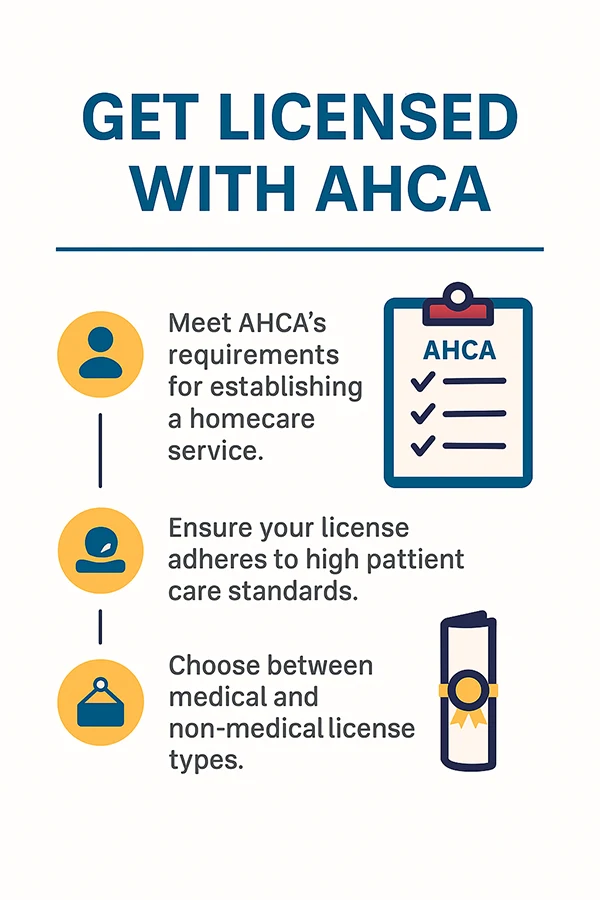What Florida Entrepreneurs Need to Know Before Entering Home Care?
KEY TAKEAWAYS
- Florida’s aging population creates high demand for senior home care services.‘
- AHCA licensing is mandatory to legally run a home care business.
- Background checks and liability insurance protect clients and your business.
- Build a strong online presence and network locally to gain clients.
- Build a strong online presence and network locally to gain clients.

Florida is experiencing explosive growth in the number of elderly individuals—by 2030, nearly 1 in 4 residents will be age 65 or older (U.S. Census Bureau).
Often, one of the most appealing businesses is simply providing much-needed care to seniors. With the strong demand for caregiving services, you will have the opportunity to provide services with heart, but also thrive as a business.
In this article, we are going to discuss the key areas for launching non-medical home care businesses. You will learn how to meet the requirements and the standards of care for the industry. The expectations you will have from your clients and your service model, will flourish amidst the challenges of regulations and competition from local and state home care providers.
1. Understand Florida’s home care market
The demand for home care services in Florida is very high due to the aging population. The ideal clients for your home care are seniors, though you can also serve all ages needing at-home support due to chronic illness or disability. Over twenty percent of residents in Florida are above 65, which is a very high number, and the competition is even fiercer in urban areas.
2. Get Licensed with AHCA
If you are going to run a homecare service in Florida, you have to adhere to AHCA requirements. The license exists to protect patients, confirming your homecare remains dedicated to maintaining the highest standards of care. There are two types of licenses: medical and non-medical, which can be easier to obtain. Below, you can see what steps to follow in order to get licensed with AHCA.

3. Knowing the legal requirements
Legally you must conduct background checks on all homecare staff to ensure you’re not hiring someone who could risk your organization. But to safeguard yourself in case that happens, liability insurance is mandatory. You should also follow Florida Statues Chapter 400 and maintain the absolute confidentiality of your client, which will ensure you are complying with HIPAA regulations.
4. Creating a solid business plan
Define your services clearly when establishing and advertising your organization, including whether you will provide companionship, nursing, or both. Set competitive prices too, ranging from \$20 to \$40 hourly, based on client needs, such as whether they are seniors or disabled. Finally, plan 6-12 months of startup costs to ensure there are no issues when you are just starting.
5. Hire qualified staff
If you are providing medical care, you should always hire Certified Nursing Assistants for proper patient care. Additionally, all caregivers must undergo a Level 2 background screening to ensure you’re hiring qualified staff who won’t pose a liability. Every caregiver should also receive training in CPR, as first aid care is highly recommended in such situations. However, if you experience high turnover, it’s essential to focus on effective retention strategies.
DID YOU KNOW?
Florida has the highest percentage of senior citizens in the US. With over 4.2 million seniors calling the Sunshine State home, that demographic shift drives massive demand and opportunity for home care services.
6. Market your services
You should always build a website for local searches and apply some SEO strategies to ensure you grab some traffic on the way. Also, try networking with hospitals and senior centers to ensure you’re expanding your reach where it matters most. Social media is also a crucial resource in the current day and age, and so you should be utilizing it to the fullest of its abilities, and you should also offer free consultations to attract more clients.
7. Understand funding and billing
Accepting private pay is vital in the home care business, especially when it comes to long-term care insurance. Also, try accepting Medicaid waivers for eligible clients and Medicare for a non-medical home care business. Finally, a clear and concise billing process is essential; ensure you have the necessary infrastructure in place to facilitate it.
Conclusion
Here are seven crucial things to remember when setting up your own homecare business. However, also remember to stay compliant with regulations, even after securing the required licenses. Regular AHCA inspections and maintaining key client records are essential. You should follow employee labor laws to ensure a low turnover rate and update policies as the rules in Florida change.
Ans: Yes, absolutely. In Florida, if you’re providing personal care services (like bathing, dressing, or help with medications), you’ll need to be Licensed by the Agency for Health Care Administration (AHCH).
Ans: Florida offers several types o home care licenses, but the most common ones include, homemaker & companion services, Nurse Registry, and home health agency.
Ans: Yes, if you are prepared. Florida has the largest senior population in the US, which means high demand. But that also means high competition and strict oversight. Knowing the local landscape and staying compliant are key to success.
